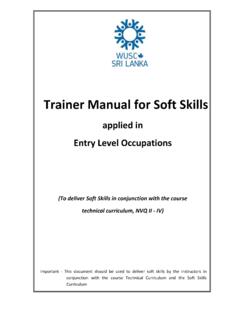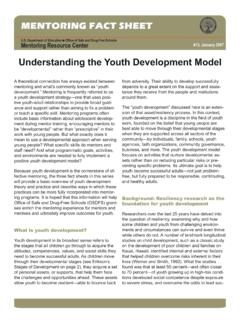Transcription of of the employability in the flesh skills of new graduates
1 Intelligencein the fleshHow new scientific understanding can help practical education regain the respect it 2009 Employers perceptions of the employability skills of new graduatesResearch commissioned by the Edge FoundationKevin Lowden, Stuart Hall, Dr Dely Elliot and Jon LewinPublished by Edge Foundation 20114 Millbank, London SW1P Foundation is a registered charity and company limited by guaranteeRegistered in England. Charity number: 286621. Company number: 1686164 University of Glasgow SCRE Centre and Edge Foundation 2011 ISBN 978-0-9565604-3-8 Report written by Kevin Lowden, Stuart Hall, Dr Dely Elliot and Jon LewinSCRE Centre at the University of Glasgow right of Kevin Lowden, Stuart Hall, Dr Dely Elliot and Jon Lewin to be identified as authors of this work has been identified in accordance with the Copyright, Designs and Patents Act 1988 The authors gratefully acknowledge the expert advice received from all of their intervieweesEdge/SCRE Centre 2011 Employers perceptions of the employability skills of new graduatesForeword by Lord Baker of Dorking iiiExecutive summary v1.
2 Introduction 12. The research project Research approach 23. Phase 1 findings: literature review and scoping interviews Definitions of employability Graduate employability in context Is Higher Education addressing employers needs? HEI measures to promote employability skills and attributes 104. Qualitative insights from the employer case studies Graduate skills and attributes that are valued by employers What do employers, students and graduates see as effective methods to promote graduate employability ? Do employers believe HEIs are doing enough to address employability ? Employers views on factors limiting HEI engagement. 165.
3 Themes arising from the HEIs interviews HEI representatives perceptions of the qualities, skills , knowledge , attributes and characteristics that promote the employability of graduates Focussing on employability Partnerships with employers Types of employability activities Use of internships, placements and work-based learning employability awards and programmes Involving employers in the design and delivery of courses Involving employers in committees and policy on employability Has the current economic climate provided an impetus for universities to work more closely with employers? Concluding remarks on employability from HEI representatives 236. Conclusions and moving forward Conclusions Recommendations and moving forward 24 References 27 ContentsEdge/SCRE Centre 2011 Employers perceptions of the employability skills of new graduatesiii1.
4 Fourth biennial Sodexo-Times Higher Education University Lifestyle Survey, 2. See, for example, Shury,J, Winterbotham, M. Davies, B and Oldfield K with Spilsbury, M. and Constable, S. (2010) National Employer skills Survey for England 2009: Main report: Evidence Report 23. IFF Research and UK Commission for Employment and SkillsEmployers perceptions of the employability skills of new graduatesForeword by Lord Baker of DorkingThere are many reasons for going to university, including naturally a love of the subject to be studied, and the opportunity to experience a different way of life. Higher education is much more than a production line for work-ready , there is no denying that people see higher education as a stepping stone to a good job. In 2010, 73% of the students who took part in the Sodexo University Lifestyle Survey1 said they went to university to improve their job Edge Foundation exists to raise the status of practical and vocational learning.
5 Some people assume that if we are for vocational education and training, we must be opposed to academic learning, including higher from it. As we say in our strapline, there are many paths to success. We value higher education every bit as much as apprenticeships, further education and adult and community course, many higher education programmes are explicitly vocational , including medicine, engineering, accountancy and law. New qualifications such as Foundation Degrees have broadened the appeal of higher education, and made it easier to access through further education colleges as well as old and new courses are less directly vocational . Nevertheless, they help students develop analytical, synoptic and presentational skills which are highly valued in the modern is that enough? Some graduates and their employers say more could be done to develop students wider skills and attributes, including team-working, communication, leadership, critical thinking and problem solving2.
6 These are known collectively as employability wanted to know what recent graduates , their employers and higher education institutions think about employability skills ; what HEIs are already doing to help students develop these skills ; and what could be done differently in the therefore commissioned the SCRE Centre at the University of Glasgow to explore these issues. To my mind, three findings stand out above all , everyone seems to agree that work placements and internships make a huge difference to employability skills . However, access to placements is patchy, to say the least. Some HEIs attach great importance to them; others do not. Some see them as relevant to all students; others seem to think they matter to engineers, but not to historians or social , many HEIs have developed graduate employability programmes. This is very welcome. However, the programmes depend too heavily on hard-pressed careers service staff, and have too little support from academic staff.
7 Furthermore, little is done to evaluate the effectiveness of most HEIs employability , employers feel ignored by HEIs. In many cases, they have few (if any) links with an HEI; and those employers relatively few in number who serve on university committees say their views on course design are report sets out some very clear recommendations for action, including placing employability at the centre of HEIs strategic planning, widening access to work placements, and promoting real and equal partnerships between employers and HEIs. I encourage principals and vice chancellors to respond positively. Equally, I urge the Government and the Higher Education Funding Council to consider very seriously the idea that future funding mechanisms should be used as a lever to encourage greater investment in students employability congratulate Kevin Lowden, Stuart Hall, Dely Elliot and Jon Lewin on their excellent report.
8 I am very grateful to them and to all the people who willingly took part in this Rt Hon Lord Baker of Dorking CH Chair, Edge Foundation Edge/SCRE Centre 2011 Employers perceptions of the employability skills of new graduatesvExecutive summaryThe SCRE Centre and the research projectSince 1928 the SCRE centre has been conducting research and evaluation with an emphasis on informing policy and practice at local, national and international level. The SCRE Centre is now part of the School of Education within the College of Social Sciences at the University of research projectThe SCRE Centre was commissioned by the Edge Foundation to explore employers perceptions of the employability skills of new graduates . The research began main data collection in 2009 and was completed in October main objectives of the researchThe research objectives were:1. To explore the perceptions of employers and Higher Education Institution staff concerning the skills , knowledge and characteristics which help undergraduates /new graduates to be To ascertain whether perceptions vary by employment sector and employer To assess whether such perceptions have influenced HEI strategies (informal and formal) to provide support, activities and learning opportunities to enhance students employability To explore what formal or informal methods are used by employers to assess graduates employability skills as part of their recruitment To assess whether there are differences in desirable employability skill sets across those who have graduated from programmes of study that have included a greater or lesser amount of work-based and work-related learning (or learning approaches that inculcate such skills ).
9 Research approachThe research had two main phases:Phase 1 Scoping activity: a brief review of literature, taking as a starting point The employability Challenge (UK Commission for Employment and skills , 2009) and encompassing relevant literature on promoting employability skills and capacity among undergraduates. Interviews with 22 key informants from representative organisations for employers HEIs and other relevant groups ( CBI, Association of Graduate Recruiters, Chambers of Commerce, Council for Industry and Higher Education etc) to explore issues pertinent to the research objectives and identify examples of good 2a) Nine qualitative employer case studies based in Scotland but including UK and multinational organisations. Originally 10 employers were approached but one of these, a UK-based multinational financial service, did not participate.
10 The research methods were intended to illuminate rather than provide generalisable findings. The selection of employer case studies, therefore, was purposive but aimed to reflect a range of employer types, sizes and sectors. The case studies focused on: employers views on graduate employability ; how they were addressing employability of graduate employees; the extent and nature of their partnership with HEIs (in order to promote employability ).The types of employers selected were: Small voluntary carers agency, west of Scotland Medium-sized food and associated products supplier, Scotland / Multinational Large local authority marketing department, Scotland Defence electronics, UK/ Multinational Construction company, UK wide Royal Navy, UK Aerospace engineering and manufacture, Multinational Bank, UK (with worldwide assets) Medium-sized manufacturing company, ScotlandEdge/SCRE Centre 2011 Employers perceptions of the employability skills of new graduatesviappropriate awareness, skills and abilities in graduates but can also promote productive collaboration and partnerships between HEIs and employers, building greater understanding between these stakeholders.





